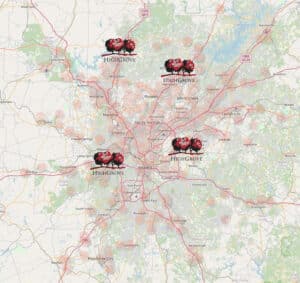 Does your plant material seem to be feeling a bit soggy or stifled lately in this Atlanta heat?
Does your plant material seem to be feeling a bit soggy or stifled lately in this Atlanta heat?
One of the top reasons plant material can suffer on your commercial property is from under or over watering. That’s why we install an irrigation system on your property.
Commercial landscaping brings together a diverse range of plants to create a rich mixture of textures and hues. Each of them has different watering requirements.
An irrigation system can be customized to fit each area of a property so the plants are getting the right amount of water where it’s needed. However, an irrigation system can still have room for error.
Adapting To The Weather
For instance, if a controller is automatically set to water on a schedule and then isn’t readjusted to adapt to the weather—for instance, say a drought or a rainy period—then you’re in a situation where you’re either under or over watering, wasting water and risking your landscape’s health.
That’s where the next level of irrigation system comes into play. Just like the technology in our phones, our computers and hand-held devices has progressed and become smarter, so has the technology in irrigation systems.
Now there are smart irrigation controllers that adapt to meet actual plant needs in each zone, optimizing water consumption, providing water savings and minimizing runoff.
How Smart Controllers Work
 Let’s talk a little bit about how smart controllers work.
Let’s talk a little bit about how smart controllers work.
Smart controllers are either climate based or soil moisture sensor based. They are programmed with site characteristics traditional controllers don’t have, such as plant type, precipitation rate, root zone depth and soil type.
These parameters are used to set up a base schedule and then the climate data or soil moisture sensor readings are used to adjust the base schedule to apply the amount of water needed.
What makes traditional controllers smarter is the addition of weather stations or climate sensors. These simple upgrades can track weather data and patterns to further educate your controller and stop your system when water isn’t required.
What Can Rain Sensors And Weather Stations Do For My Irrigation System?
There are many different types of rain and climate sensors and weather stations for commercial irrigation systems.
Rain Sensors
Rain sensors for irrigation systems are designed to interrupt an irrigation cycle during a rain event. Moisture sensors are buried in the ground, and when there is an ample moisture in the soil, this device stops the irrigation system from running.
Mainline sensors can protect your business by monitoring the amount of water flowing through your irrigation system. If an excessive flow occurs, the moisture sensor shuts down your system to prevent flooding.
Climate Sensors & Weather Stations
Climate sensors or weather stations are the most complex and advanced of them all. They calculate the evapotranspiration rate (ET) on a site and automatically adjust your irrigation system’s run times to only apply the exact amount of water lost from the last irrigation cycle or rain event. ET is the loss of water from the soil both by evaporation and by transpiration from the plants growing there.
Weather stations can prevent system activation by automatically stopping water flow when outdoor temperatures drop near freezing, shutting off systems during periods of high wind and resetting them when conditions are more favorable. This takes a lot of the guesswork and time involved in managing the system out of the equation.
Recent advances, including wireless receivers, have made today’s irrigation sensors easier to use than their predecessors. The days of hard-wiring sensors, mounting them on buildings and trying to hide them for aesthetic reasons are gone. Now they can be wireless and even managed remotely from a central control system or even a smartphone.
This enables property managers and commercial landscapers to more precisely refine your watering needs and ultimately save you money.
Sensors and Sensibility
 While rain sensors for irrigation systems are integral components, becoming educated on their importance and use can help everyone make sure this technology is living up to its potential and proper commercial water management is in place.
While rain sensors for irrigation systems are integral components, becoming educated on their importance and use can help everyone make sure this technology is living up to its potential and proper commercial water management is in place.
HighGrove Partners’ experts will educate you on commercial irrigation system sensors and let you know what your system needs to maximize performance and minimize water. Give us a call at 678-298-0550, or use our simple contact form.
In the meantime, get our Complete Guide To Water Management below. This FREE e-book will help you create a commercial landscape irrigation and stormwater management plan that maximizes your property’s efficient water use.
Last modified: February 10, 2022



